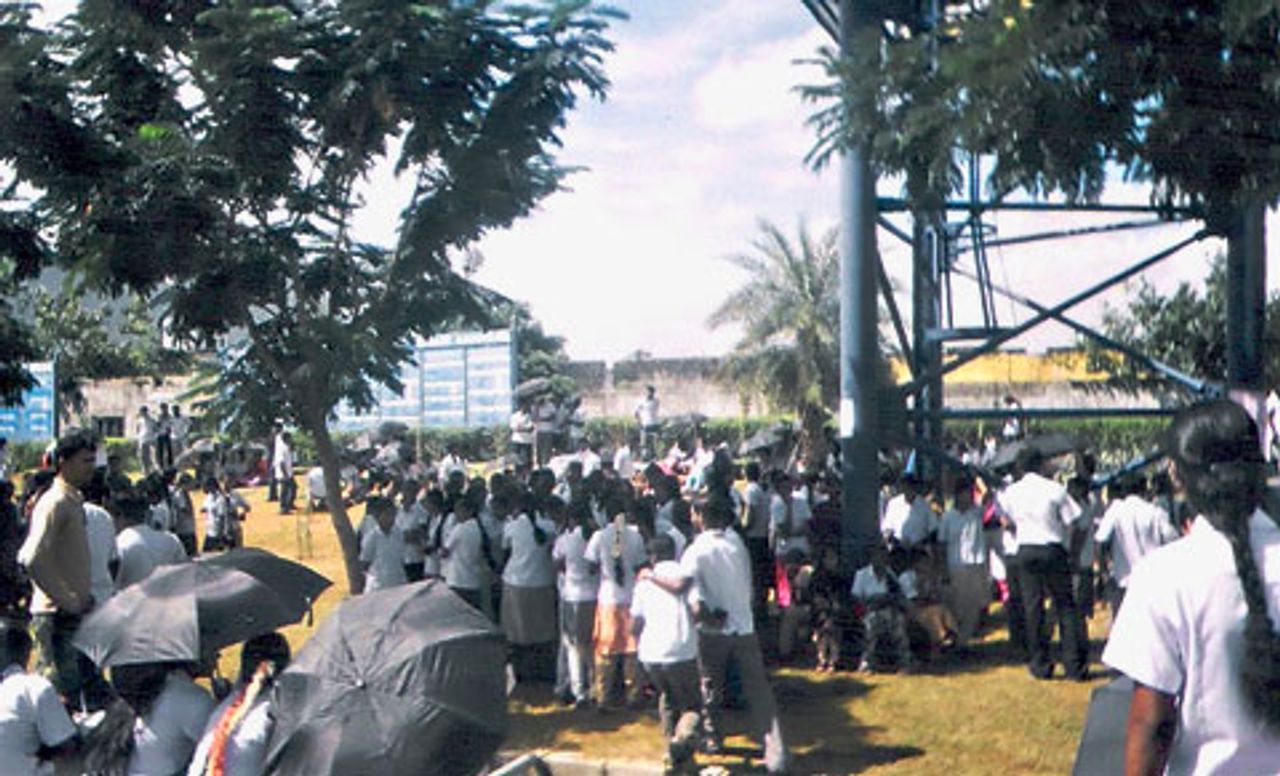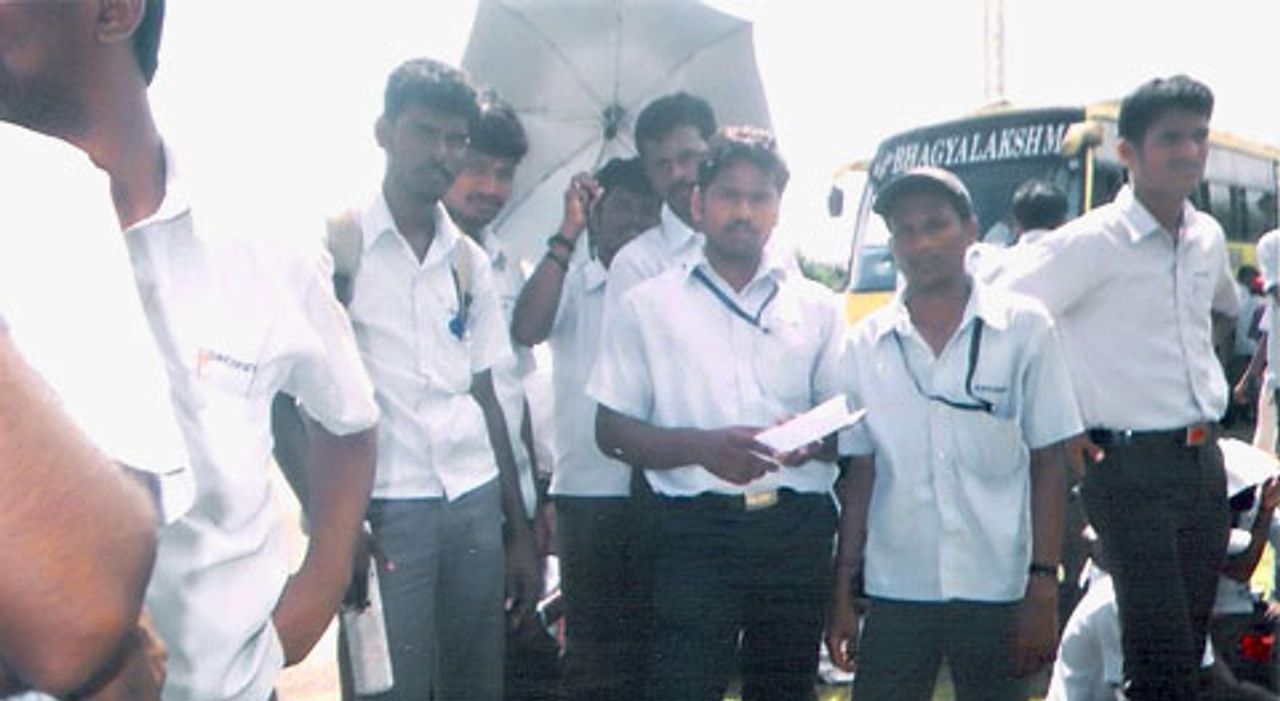Thousands of workers are continuing their walkout at a factory owned by Taiwan-based Foxconn corporation in Sriperumbudur, in the southern Indian state of Tamil Nadu despite violent attacks by police. On September 24, police forces broke up an occupation of the plant by workers, brutally beating dozens and detaining 1,200 workers for a whole day before releasing them in the evening.
 Striking workers at Foxconn plant in Sriperumbudur, India
Striking workers at Foxconn plant in Sriperumbudur, IndiaThis was the second occupation in Sriperumbudur broken up by police in recent months. In June, police attacked and arrested 300 workers conducting a sit-down strike at the Korean-owned Hyundai automobile plant in the city.
Foxconn Corporation, which has 920,000 employees worldwide, recently gained international notoriety for the brutal conditions inside its factories after 10 workers at its Chinese plant in Shenzen committed suicide. (See, “Foxconn suicides highlight China’s sweatshop conditions”)
With 7,000 workers Foxconn India is the third largest industrial employer in Tamil Nadu after Hyundai and Nokia. Workers at the factory began an occupation—a form of struggle widely practiced in India—on September 21. They demanded that management negotiate a pay increase and extend recognition to their trade union Thozilalar Sangam (FITS), which is affiliated with the Stalinist Communist Party of India (Marxist).
Prior to this strike management provocatively declared they would only recognize a rival union, Thozilalar Munnetra Sangam (FITMS), which is affiliated with the Dravida Munnetra Kazhagam (DMK) party that currently rules Tamil Nadu in a coalition government. DMK is also part of the Congress Party-led United Progressive Alliance (UPA) coalition that rules India.
The DMK has openly sided with the management in all workers’ disputes in the state and has not hesitated to use brutal tactics to break up workers’ struggles.
Given the utterly degenerate nature of the unions affiliated to regional and national political parties, the Stalinist CITU has been able to gain a leading role in a number of strikes. In the end, however, it functions as a safety valve to dissipate the anger of workers. The CITU has called several strikes and employed militant rhetoric only to isolate these struggles and lead them to defeat.
This tactic was clearly demonstrated when the CITU-affiliated union called off the sit-in strike the day after the struggle began on September 21. Determined to teach workers a lesson Foxconn management resorted to vindictive measures including posting a notice that strikers would have eight days of wages deducted from their pay.
In response to this provocation night-shift workers began another sit-in on September 23. The company then threatened workers with severe legal repercussions, issuing a public statement saying it had “obtained an injunction order from the court restraining workers from carrying out such illegal strike, assembly, demonstration, obstructing people, obstructing movement of men and materials and other such disruptive methods and practice within 100 metres from its premises.”
The rebellious workers did not relent and escalated their fight by occupying the factory, leading to the police attack on Friday, September 24.
A senior Foxconn official justified the assault claiming the strike was illegal. “The workers should have given eight weeks notice for units located in special economic zones (SEZ), whereas the Centre for Indian Trade Union (CITU) gave us around two weeks’ notice.”
The Indian ruling elite has set up SEZs to attract business investment. In these zones domestic and multinational corporations are offered publicly funded infrastructure, lax or even non-existent safety standards, tax breaks, and, above all, cheap labor. While working conditions in India in general are shockingly brutal, the conditions confronting workers in the SEZs are particularly egregious.
In July, 250 workers at a neighboring Foxconn plant had to be hospitalized after becoming sick at the plant. It is suspected that workers fell ill after inhaling insecticide and pesticides the company liberally sprayed in working areas despite the health dangers. The plant also lacked proper ventilation, thus exposing the workers not only to polluted air, but also the sweltering heat the region is noted for.
There is growing worker anger over soaring food prices, job cuts, privatization and widening social inequality. The Stalinists seek to confine resistance to trade union actions and isolated protests aimed at pressuring this or that bourgeois party.
In Tamil Nadu, the Stalinist CPM has swung back and forth in alliance between the two reactionary parties that dominate state politics; the DMK headed by the Karunanidhi clan and its bitter rival, the All India Anna Dravida Munnetra Kazhagam (AIADMK) headed by an actress-turned-politician, Jayalalitha.
The CPM has approached Jayalalitha to mount joint struggles on “people’s issues” even though she is a rabidly anti-working class politician. In 2003, Jayalalitha sacked hundreds of thousands of state employees after they struck to demand higher pay and benefits. (See, “India: Tamil Nadu government continues witchhunt of strikers”). This has not stopped the CPM from seeking an electoral bloc with AIADMK in the upcoming state assembly elections in 2011.
The massive response in the Indian working class to the September 7 general strike was a testament to its growing anger and militancy. While the Indian and foreign press touts India’s economic rise, the already precarious living conditions of the working class has been squeezed by the twin blows of uncontrolled rise in food prices and falling incomes.
Reporters from the World Socialist Web Site visited the Foxconn plant where thousands of workers gathered outside the factory gates. The atmosphere was intimidating, with a heavy police presence, including plain cloths cops. Because of this workers used their first names only.
 Striking workers at Foxconn plant in Sriperumbudur, India
Striking workers at Foxconn plant in Sriperumbudur, IndiaSrikanth, 24, told the WSWS, “I have been working in this company for four years. I get paid Rs.4,800 ($104) per month. Wages in this company ranges from Rs. 2,900 ($63) to Rs.4,800. With the increasing inflation wages are very low. The union the company wants is a pro-management union. We don’t believe in it. Management is insisting on talking to that union.”
The young worker also spoke on the appalling conditions inside the plant. “In order to exploit cheap labour they bring workers in by bus from many villages. The workers are from families of poor farmers or agricultural workers. They spend an extra six hours traveling every day. There is no canteen facility available for workers inside the plant premises.
“There are nearly 400 contract workers going to work despite our indefinite strike.”
Srikanth said management has suspended 23 workers for participation in union activities. “We don’t get any other benefits except Provident Fund and Employees Social Insurances (ESI).”
Kasi, 23, said, “They make us work hard by setting targets. Our main demand is a wage rise and recognition of our union. We demand a monthly salary of Rs.15,000 ($326), after deductions, take-home pay of Rs.10,000 ($ 217). We intend to continue our struggle if our union is not recognized.”
Susila, a 20-year-old female worker told the WSWS, “During the sit-in strike I was attacked by police. Another worker started bleeding after the police attacked. I was arrested.” The police, she said, had harassed her, asking provocatively, “whether I come for work or something else?”
Another female worker said, “I have been working in this company for four years. I get a monthly salary of Rs.3,000 ($65). My husband works in another company and gets paid Rs.5,000 ($108) a month. With growing inflation it is difficult to run our family with our combined salaries. I am scared about this situation.”
Despite the militant mood and sentiments of the workers there is every danger that the Stalinist CPM and CITU will abort the struggle, thus allowing the management to impose its will.
